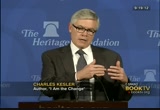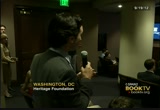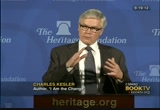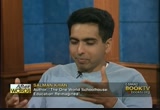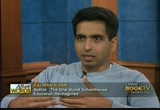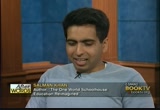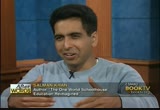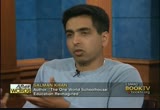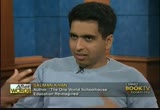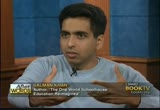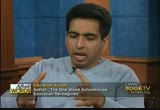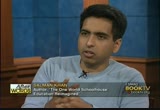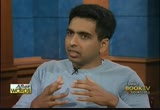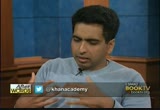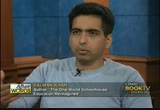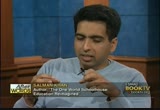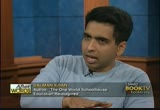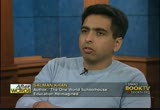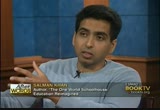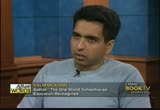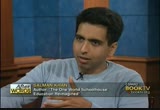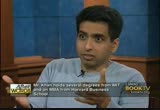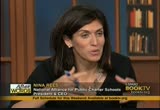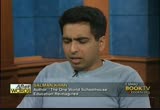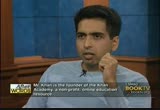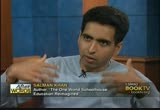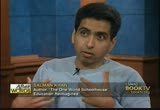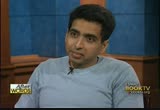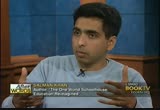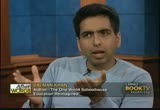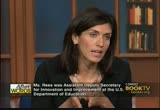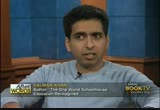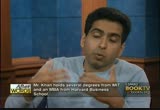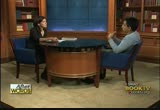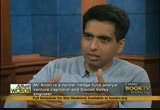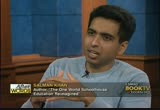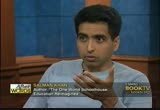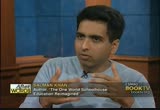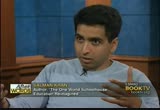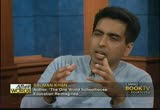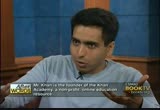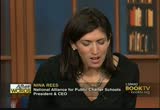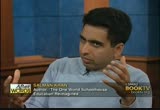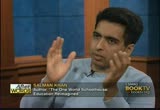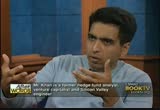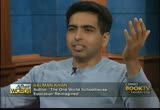tv Book TV After Words CSPAN November 3, 2012 10:00pm-11:00pm EDT
10:00 pm
impose a vision on them that's not timely. now, what does that mean in practice, though? especially if -- especially in the least democratic branch that has the least sympathy with or contact with the public and their needs, and ixd think what we've seen, which wilson did not, i think, anticipate was that under certain circumstances, judges would take this theory and run with it. ..
10:01 pm
>> interesting that you classify obama as something of a wilsonian liberal progressive and i wanted to get your thoughts on the idea that he might come from a slightly different strain because globally between liberal progressives and social democrats on the left and it seems to me that given his heavy connection with organized labor and community organizing as opposed to previous democratic presidency seems to be far more social democratic than a liberal progressive. >> well, i think the difficulty is that he is much, i mean he gets support from labor unions to be sure but they are mostly public employees labor unions.
10:02 pm
his connection to labor in the old traditional social democratic way or in american language sort of the democratic machine ways, is very tenuous, it seems to me. he is -- i mean i read him as much more academic, much more ideological and interested in the new class as irving kristol used to call it of progressive unions to the extent that they are progressive and not so much in other kinds of unions. and his appeal is to, is to groups that are, that owes
10:03 pm
something to government and our cutting-edge lifestyle or identity. and so women particularly unmarried women or divorced women, single and others, and hispanic and black caucuses of one kind or another, i mean he really has assembled a coalition that might in some respects rangel -- old politics but in spirit is quite different. >> last question here in the back. >> you mentioned your colleague built locally and he wrote a book called never enough in which he basically tells conservatives that we'd need to accept the reality of the welfare state and then figure out where to draw the line. i detect a certain pair listen with you on the left that we are
10:04 pm
going to need to accept and limits themselves and i'm curious to know if it's an opportunity that they will vanish overnight but there there will be a reckoning with the fiscal mess they are in from exhaustion. what's going to happen to them? what is that line they are going to try in terms of admitting this whole project can't go on? >> well i think that will be the occasion of furious infighting on the left. because the fiscal crisis is also a moral crisis. i mean you have made all these promises for generations and you made them in such a way as to intimate that these were permanent binding commitments. the whole point of fdr calling these things, these new rights a second bill of rights is to suggest they were just as important as just as permanent as this first bill of rights and just as you wouldn't say we
10:05 pm
can't give up on free speech, it's costing too much, you don't say well we have to give up on medicare because it's costing too much. you find the money because it's a duty. but there will also be people on left to say look, this is a high-risk strategy. we could lose everything. why don't we take half a loaf or a little more and compromise, change the terms and there have been some efforts already made in the 80's and along these moderate lines. but i think because of the enormity of the coming problem, the coming gap in funding versus promises made, it can be finessed as easily as as set as social securitywise in the 1980s. so i think they will have a tremendous fight among
10:06 pm
themselves and it will be interesting to see what conservatives say in their circumstances themselves. because we too, i mean when alexander hamilton wrote about the public credit he made it explicit. there too many to the term. one is can we borrow from other countries or other people and secondly, are our promises good? will they accept their promise to pay them back and will we use the money for the purposes we borrowed it for and wisely administered that that's? and those issues are very tightly interwoven in this whole problem of the welfare state. my friend built locally, one of his solutions was to move towards means testing, more and more of it so that you know, in a presumably rich country and
10:07 pm
one that is getting richer broadly speaking over time, individual should be able to pay for more of their own benefits, because society -- i mean if you look over the last several years society is a lot richer than it was. if you look over the past 100 years it is phenomenally more rich that it used to be. his ideas you can shrink the welfare state by confining it more and more to the truly needy and freeing up other people to make their own arrangements. i think that is not an unreasonable solution but i don't know if it's politically viable. >> thank you. >> thank you. [applause]
10:08 pm
the president of the national alliance of public charter schools. this week's salman salman khan s book "the one world schoolhouse." in it he -- the former hedge fund analyst also discusses his career change to public educator. >> host: tell us a little bit about your book and the journey that you underwent before you started the khan academy which led you to writing this book? >> guest: the book, it's a little bit about that journey but really how that journey and formed what khan academy has become and how that formed what may be classrooms could become or what learning could be, not just a pie-in-the-sky kind of way but in a way that feels like we are in a kind of plexus plan and what is going on in the classroom.
10:09 pm
this whole adventure for me started very inadvertently. in 2004 i was working as an analyst at data hedge fund at the time. i just got married. family from new york lands visiting me in boston after the wedding and it turns out this one cousin was having trouble, 12 years old. i had trouble believing that. she is an extremely bright girl. we share the same dna. [laughter] and when i asked her, i asked her mom and asked nadia and she said oh no yeah. let me tutor you and i think she thought i was just bluffing. i said no we are going to work this out so she got back to new orleans and got on the phone and we use tools on the internet so we could teach with the mouse and these penpal things. long story short, she went from being a struggling student to catching up with the class and
10:10 pm
becoming somewhat advanced. i called her school and i think nadia needs to retake a placement exam and they said who are you? well, i'm i am her cousin. but then i started to tutor her brother and fast-forward two years. i was tutoring 10 or 15 family friends, cousins and it was that point that, and the firm i was working for, my boss and me, we moved to silicon valley and i was showing a friend and i was complaining that it was getting hard to scale. i still had a day job, going run the country and timezones etc. said her. he why don't you pick it up on youtube and make tutorials. i thought that was a idea.
10:11 pm
but i gave it a shot and long story short that started getting a ton of traction and people started looking at it. i also was working on this software tool for my cousin so there was his view that hey maybe this could be an institution to help people so the setup set up was a not-for-profit and in 2009 by quit my day job and started doing it full time. >> host: tell me about the khan economy. let's start with the audacious school which i just found very big and audacious, the business model that you based it on? >> guest: maybe i will go the other way around because when i was starting all of this in i came from a for-profit reality. i have friends who are venture capitalists. they said we could form the senate could be this double bottom-line business and there was a lot of temptation there. there's nothing wrong with that but there's this there is this feeling and i was getting all of
10:12 pm
this emotional reward from the thank you letters of people were sending me in the sense that i took a simple thing for my cousin and hundreds of thousands if not millions of students are using around the world. i'd like to step to be around in 100 years or 500 years and i don't want this collection of software and content and disorganization, i don't want it wanted to skew from this mission of being able to reach people. what i looked at other organizations in the universe that are able to do that and last centuries and it's a not-for-profit where there is no ownership and is a public charity. and so i said it's a not-for-profit not quite understanding what that is and what i was doing the initial paperwork for the irs asked me, what's your mission? i kind of thought about it for three or four minutes and i said oh a free world-class education for anyone anywhere.
10:13 pm
you never want something that you can just say check, it's done and it was a very delusional aspiration at the time. i was literally operating out of the closet that yeah and so the business model is we are not a business. we are a 501(c)(3) not-for-profit but we still have to sustain ourselves in the in the end the way we want to, with eyes want the learning side of education we always want that freedom because we think that's what empowers people. is primarily foundation and philanthropist so far but we do think there are ways to sustain itself in other ways whether by content or who knows what but we are starting to explore that. where truly keeping the content free. >> host: how many students are you serving right now and how many instructors? can you give me a sense of how large of an enterprise that is? a physical profile of someone who comes to your web site. >> guest: so the organization itself, we are 36 people so we are relatively small but last year we were 13 and the year before that we were one so we
10:14 pm
have been growing fast. in this past month we have 7 million students, unique students. we have reached a total of 60 million. delivered 180 million lessons, 700 million problems have been done on the site and you know students all over the world, pretty much every country in the world. some have used the khan academy in some way. 1000 teachers as far as we can tell from our data are using it in their classes or with their cohorts in some type of ways so it's surreal for where it came from. >> let's talk a little bit about how a classroom or school can use you, the concept of a flip classroom. explain that to our viewers. >> guest: yeah. i will do two things because a flip classroom is somewhat tied to the khan academy and it is a?
10:15 pm
adjusting idea and a forward step but part of the whole point of this whole book was we are not necessarily about the split. we are about pushing the envelope further than the flip so in a flip model right now that whom you to problems initially in the classroom. a lot of times in a traditional classroom they send lectures and the flip is that it's a three day khan academy and early on i sent videos out there because the teachers would tell me you made a decent video on projectile motion. i don't have to give that lecture anymore and my students can watch it at anytime of any time of day in her immediate -- remediate and when they go to class that is when the computer asks questions and we can to problems together. the problem sets could be done inside the classroom and the advantage there is the real learning occurs when you do engagement and you are doing the problems. traditionally students either
10:16 pm
don't do homework or have trouble doing work because there is no one at home to help them out and now there is a classroom. they have their peers which is an underutilized resource in the classroom not only to help them but when you have others you learned and gives the teacher lens on how the classes doing. when you are lecturing it's very hard to know where people are. you might be able to pull them ask a few questions but it's hard to go back to these blank faces. now doing problem-solving together you can do much more -- understand her her students learn diagnosed him so that is the flip. what used to be homered in the classroom and what used to be lectures are now at home. it makes a classroom interactive i focus on a locked in the book, let's go further because even the flip assumes all the students will cover the same material on the same page together and what i talk a lot about is you know we have all
10:17 pm
been indoctrinated into the system and when i'm talking about the system i'm not talking about weapons should be the student-teacher ratio or charter or public or private. i'm talking about grouping kids by age base forward and covering certain subjects and the grades are based on berryville understanding. we just assume that is what the school is but i go to great lengths to show no this know ths a relatively new phenomenon. it's not 200 years old but we inherited from a country that no longer exists, the prussians and in fairness to the prescience and to us i guess, during the industrial revolution was the first time people seriously thought about how can we educate everybody? before that it was you are the son of the lord and the king and you get a private tutor in a private tutor was the gold
10:18 pm
standard. they are differentiating it for you but all of a sudden it's now we want to have massive education and how do we do it in a practical way? with the industrial revolution. we put them on an assembly line and as they go through we do something to the product and we have a decent products of product so they essentially apply the same model to the classroom. it's funny i was talking to a friend and their child already knows how to read and she's trying to get their child into the cavern. he is like for an october something and the school says he is a very bright kid but now we can't. he is too small. i told my friend, she came back and asked, look, if that is what they are concerned about than they should be grouping them by size. so that is the model. and even the flip is in the context of the model.
10:19 pm
week for recovery equations and even if you have, when you get good grades, we give them a p and that shows them at the gap in their knowledge and a c or d on exam, it's usually building on top of that which usually means failure. what i advocate strongly is schools to experiment are moving this direction, if you take the lecture out of the classroom there is no longer the need for everyone to move together on the same page. as soon as you get rid of that assumption you can completely rethink what a classroom may be. at it and have everyone at their own pace and leverage class time for activities. you can say why do we only have one teacher in the room and why white we have two teachers in the room? why do we have a pill. is like a 19th century factory. way do we have a bell ringing to say stop on chemistry and you must now start english. anyone who has done everything everything -- think anything creative the worst thing to do is to say you have exactly 55
10:20 pm
minutes and then you are done. what what we are advocating is possibly with the help of tools like khan academy so teachers have dashboards and schools that empower them and use class time for interactivity and creativity. >> host: you touched him as a little bit but explain a little bit about why is it that your form has taken off and is getting so much attention and wind some and the others who have tried to do the thing -- same thing some on the nonprofit side of some on the profit side have not succeeded? >> guest: is a common question we are asking ourselves. my best guess of why there is this wave of traction from 2006 that continues to grow is those first videos i think we were fortunate that it was just some guy making it for his cousin.
10:21 pm
>> host: they they were easy-to-use. >> guest: they were easy to use and i human. i wasn't the first person to think of teaching -- when the radio came out they were like we will use the radio to teach the world. but historically it was either it was somewhat of a chalkboard, a traditional class which feels different when you're in the classroom. you are there and i'm over here in the next up is the equation and you do it like that so that is -- do we make that in the video. what are they writing their and i can hear them. it's all very personal. you are sitting next to me. the other dimension is the conversational tone. i think a lot of people, there try to make it very polished which is not bad but in the process used loosely loose the humanity sowed you sound like system.
10:22 pm
and i think hopefully and this is something i tried to put into it, one of the things i tank it allows me to do is to kind of -- in math or science, felt like i had a holistic understanding. my bases were really really solid so when i went to calculus is that this is intuitive and what i wanted to corporate finance is that this is intuitive. there's nothing new here and you see other really really smart people, they are just memorizing formulas and then they forget it and when they see a related concept it's like, what's this? what i tried to do with my cousin is give a sense of intuition and draw the connection so it's not some random concept. it's connected to everything they have learned before and i get a lot of letters, i would assume that would have only been appealing to motivated kids so to speak but i get a lot of letters from kids who were traditionally disengaged and
10:23 pm
they said that is why it was not motivated. nobody was saying why. no one was giving me the connection so hopefully that is why people have been connecting to this. >> host: lets talk a little bit about virtual education and offering the types of things you're offering. a lot of people are still a little leery of this form. they see it as a mechanism to ultimately get rid of teachers in the classroom and reduce class sizes. you talk a little bit about this in the book. if you could explain that a little bit. >> that is a good point. whenever people see virtual, like is that going to replace the physical? on barnes & noble and amazon.com there's a natural intention there. that is exactly the opposite of what's going happen education. everything we do is not going to replace school. i have kids and i want them to go to schools. i wanted to get interaction. what it will do is i think give
10:24 pm
all of her education and experience that i think every parent and every teacher or a verse dude to be part of and even now they are not leveraging the human. for the most part people are sitting there and talking to the teachers too to cause its it's hard to speak for students without getting connection with students. what we are advocating is leverage tools so you can get any information delivery out of the way and get some of the problem-solving out of the way so when people go in math class time with other human beings, that is interactive and that interaction as a human sense. class time is all peer tutoring and working with the teacher. class time is open in the project so i talk about this in the book. the irony here is i strongly believe and it's not just talking that you are seeing this in the classrooms, is you can
10:25 pm
use technology to make the classroom or human. and i'm very careful, you mention skepticism. i'm very skeptical today. how are you going to integrated into the curriculum or leverage it to make it department khalif transform is going on and there usually aren't a lot of answers there. i think it is good to be skeptical but at the same time there is i think a reason for hope. >> how do you evaluate the impact of your courses? you talk a little bit about grades in your book and how do you know that they have actually worked? >> guest: yeah and a lot of times, when i grew up eyes sometimes we hear people say or believe in grades and i thought the were these granola bar type people. now i think i appreciate what they were saying. normally when you say people don't like grades, you think they're being touchy-feely and they are not being rigorous but
10:26 pm
they are saying grades are not rigorous enough. grades are the things that give us that feeling of rigor, a, b you know yourself an f you don't mind yourself. they are somewhat arbitrary and it depends on how it's measured but even more than that when you give the greatest special innocents, on an exam to have obvious weaknesses assuming it's a good exam for it or you have weaknesses so that should be an assessment to say okay you need to improve on those. before we move on to a more danced topic at the basics down but instead we use a value judgment. you are smart, you are, you are slow. what we say as now let's just make sure we have mastered the concepts are rather of rather than having a super -- make sure you understand algebra deeply and that will make a lot more sense. if you master trigonometry bank
10:27 pm
oculus will seem very intuitive. we are working with schools and some -- one of the best is using con academy as one of the tools to be used and there we have sets going on to understand how it impacts the students and the teachers and objectively on things like test scores and grades but also on subjects. are the teachers more excited about the work and are there students more excited about the were? on top of that we have 3 million problems a day in the huge number of students, we have a treasure trove of data ourselves. all these other web companies are able to do, we as a not-for-profit can cannot do using analytics, optimizing and
10:28 pm
seeing what kind of learning is going on. >> host: so tell me a little bit about, he viewed give a great historical overview of how we came to educate people today in the way we are educating them. did you always hold these views in all this information before you stumbled on the khan academy or this platform you created or were these things that you studied afterwards? it just so happened that everything flowed so beautifully. i was curious as to what came first. >> guest: it's been a combination and i actually think it's more of a lecture. all of us have spent a lot of time in the system. anybody who knew me growing up, they knew i was always like why is it this way and why is it that way and why can't i tutor? i would get reprimanded for tutoring. this is a really positive interactions so the question when you go to college, people are sitting in this lecture hall and is anything really happening in here? it seems like the learning is
10:29 pm
happening in the cram session a few days before the final. obviously when i worked with my cousins, my cousins were not motivated but they were having these huge gaps in knowledge. they were not learning intuitively. so in a very pragmatic way i started using these tools that was a process of discovery. teacher e-mailing, let's do it this way unless it that way so the sense thinks of how did i learn and how did other people that i know, how did they learn, what did i learn with my cousins and what are the teachers telling may? a kind of got more traction and i started having people tell me. i knew a little bit about this before and someone had told me about -- in high school but it was interesting that even the research, the reason why make a made the video so short is you are limited to 10 minutes but then the researcher was to let
10:30 pm
me know there is cognitive research that shows that is where the research from the book comes from especially the active kant -- context and not pay attention for more than 10 to 15 minutes. why are we using class time for these hour-long lectures, academic lectures? the mortgage research a lot of these basic commonsense ideas common sense ideas gelled with the research. when research tells you something nonintuitive but here tells you something very very intuitive. the heart to grasping as we are indoctrinated into the strange model. >> host: it all makes sense. tell me about your education and despite the regimented system that you grew up in, something must have gone right. was at your teacher, was it your parents beds gave you the sense of inquisitiveness or was that yeah did you go from a particular type of school that
10:31 pm
was open to nurturing you as an individual paying attention to your specific needs or yeah any of these things? >> guest: no, no, i am sometimes delusional but i think there are two. they're a bunch of different factors and i'm probably forgetting some of them. one of them as i have an older sister who was a very good student but when i would walk into a classroom, the teachers would remember my sister and say oh you are her brother. i was in speech therapy but you project that and they're now studies that show that projection has huge implications for your own self-esteem so that was luck. on top of that there was a public school in jefferson parish right outside of new orleans. the average american public school, elementary, middle and high school but there were some
10:32 pm
incredible teachers there. i think in high school in particular mr. hernandez, mr. kennedy. mr. kennedy was a journalism teacher. class should not be lecture. clash of the working alongside students in the journalism class. we had a creative project. she would give us feedback and i remember those interactions. a lot of the experience i got from journalism i still think about when i'm working on the khan academy. early, i was lucky i got into what you call now the ct program and what they did was you have is very structured prussian curriculum for most of the day but one day a week they take you out of the classroom and into this unique classroom. here you go into this classroom which is essentially the kind of classroom i believe everyone should have. you have these two teachers and they have ph.d.s in education and i remember the first day walking into ct and
10:33 pm
she says what do you want to do? i was like, i like to draw. then she said you should draw more than. she would introduce me to different styles and different tools to draw. what else are you adjusted in? i was like, i like puzzles. she was like you're some puzzles and she would give me these brainteasers so she was mentoring and it was self-paced. other kids were working on interesting things and i would get inspired by that of sometimes who worked on thing. i think when he do that briefing room. i wonder if i didn't have that experience of my life whether i would have had the ability to kind of self-directed or the ability to say oh with the fall of that problem. that is an interesting thing to tackle. >> host: do you have any advice for parents out there for first-graders are second-graders and i'm asking you this because in your book you also highlight how a lot of teachers from southeast asia go to school and show off what they know, not
10:34 pm
less fairly learned in schools soar their habit to think parents can start to put in place early on despite how the schools are approaching education? >> guest: i have a 3-year-old and a 1-year-old so maybe i should give insight from a -- i'm trying to get my 1-year-old off the pacifier. [laughter] exactly right. my sense, having gone through this and working with a lot of teachers of a lot of schools now, there are a couple of dimensions. i think it is true, asians, east asians, south asians, there is a culture of school is where you go to show what yorkie learned at home but i think those students have an advantage of having this buffer of learning stuff may be it. i to say that it is a way it has to pay but it's the way the students and oppression bottle --
10:35 pm
as soon as they fall behind these negative self-perceptions or to reinforce each other. i will tell you what i would do with my own children. some combination of, maybe it was a lot of the content to become successful so when you tutor, when i was tutoring nadia. when i started teaching algebra ii her younger brother, he said it was fun. there is no stress here. so exposure kids to the ideas of algebra and physics and biology and chemistry early on so when they see you in school they have already had some exposure. the other thing i would say is don't over schedule them. sometimes the same parents that, the same parents that would do the teaching ahead of time are at the same time giving soccer lessons, piano lessons. there's a value there definitely but overscheduling, you have the
10:36 pm
loss of the time for their child to develop their own creativity. kind of like what i had an sct class, the last ski child. my mom worked these are jobs and she would come home at 6:00 or 7:00 so me and my sister would hang out and a lot of it was wasted watching tv but a lot of it was i want to build something or want to draw and we would make up games and stuff like that. kids need that free . maybe if they are using it on video games or tv, do something creative with them but they need that time for creativity. the last thing i would recommend is the parents themselves engage in learning. if you set that example, if you are 40 or 50 or so when you are going back in learning algebra cosmetology or anything. >> host: let's talk about your vision for the classroom or this futuristic vision you outline here about the school is tomorrow should look like which is a lifelong learning approach to education and you also talk about the college of tomorrow.
10:37 pm
i was fascinated by that. let's talk your notions of class size in the ae a classroom. could have potentially have 100 students and structures roaming around. you talk a little bit about that already but testing. this is one of the topics that comes up a lot here in washington and in the discussions on capitol hill that yeah, how would you describe that vision for us and tell as you would get rid of summer vacations? that is not going to be popular. >> guest: there's a lot there. the first dimension is, once you move the lecture from class time and you could have students looking at their own -- a lot of the concepts in this book and a lot of these are happening. they their schools that'll we are working with it are doing these things. there at our experiments but they are experiments that all the research and all of the intuition point in that direction. teaching it for the most part is
10:38 pm
a solitary profession. you are the only teacher in the room. it is lonely so you could have 100 students and you are not changing the student-teacher ratio. you may improve it but now you have four teachers in the room. of one of them gets sick you don't need a substitute teacher. they can mentor each other and to group things together but there's a whole dimension you can add. you can have a physics teacher, math teacher, chemistry teacher in a biology teacher all teaching simultaneously. all these blend together and they're not just like silos of subjects where you get holistic understanding. the test themselves need some aspect of testing. someone should be skeptical of testing because all skeptical of what they test. there are many more facets to a human being than that. there should be some testing to make sure students are getting core competency and score -- core skills but the more
10:39 pm
important skills that are unmeasured now our creativity. you can ever give someone a creativity score but even if someone generated portfolio of their work. as an employer we are hiring engineers and we get these people from top schools in the country and what have you created? that is what engineering is. building new things. they haven't created anything because they have been on the treadmill the whole time trying to finish problem sets. they are very very smart people but the idea is students over their careers can show what they have created. it's not like they wrote a paper that gets graded and gets thrown away. they write a paper and they keep working on it and they develop it. when they're 18 they have a lot of policies and they can show people, this is my work and they have a computer program or they built a robot. this is another dimension that is completely messed in the prussian model so to speak. i think in any field the people
10:40 pm
you want to work with the most are the people who have deep subject matter expertise but are also always willing to help other and they have the communication ability and the ability to empathize. in our current system we make everyone focus on themselves. what are your grades? are you going to pass the test? in the model we are describing we are starting to see in a lot of schools, let's focus everyone on each other. you go at your own pace and you may be ahead and that's great but you also have a chance to reengage the students who might be having difficulty. when you'll be helping a student but even better when you explain that and you develop your way to explain you will learn the material better and learn to communicate and empathize. that is actually measurable. you can ask people to write assessments for each other. oh you understood it but she spoke little fast and you can develop that is it. i would imagine the transcript of the future and i say the future but i mean the future actually now, you would have
10:41 pm
their test scores and their test scores would show competency. i understand algebra and i've renewed it that i know algebra well and i'm a writer. here is my writing. if you have a portfolio of your creative work is multidimensional and you have reviews from refused from people that you have helped. a great person to work with, really understood the subject matter and really was able to commit a hate well and those are things anyone would care more about than just a test scores. >> host: let's talk a little bit about what happens in the classroom or the school in terms of subject. you believe right now you have to take math and you have to take english and language arts and you start science at a certain point in time. do you believe that these basic should be taught in the school and at what point? another question i wanted to ask is do you believe all children can learn unless they have a serious disability? can they'll progress at the level that you have progressed
10:42 pm
if they simply learn and master and show an interest really in the subject matter that they are studying? specifically in the stem field, the science, technology engineering and math which are areas that people tend not to get interested in. just because you have not mastered it well and push to understand early on, are there limitations perhaps in and how we are currently trying to get the subject? gets on the latter question if you had asked me 20 years ago i was would say. al: certain people lean more towards math and science and other people don't. i was one of those people that was predisposed and i felt like i was meant to be but my experience with my cousins, not in particular and other cousins and what abc and schools. schools have for transitioning to the model where all the students are learning at their own pace, building their foundation. yes some kids are the get
10:43 pm
tickets and some kids are falling behind. the traditional model you itself -- not separate them and you would tell the kids that you are smart and you're not as smart. what we are seeing is if you keep them together and allow them to work at their own pace so they are engaged in a up mentorship of each other in the teacher, many times it's very hard. some of the students were falling behind. they were announced to the class and some of them don't do multiplication well and hit to give them a opportunity to build a foundation on negative numbers in multiplication or whatever it might be than the kids race ahead. the problem wasn't that they had cognitive inability to understand algebra. the problem was they were sitting announce request in now to request some reason i didn't understand that the multiplier and fractions. you are going to feel silly and a positive class and you will disengage to protect yourself. i'm more now convinced that pretty much everyone barring
10:44 pm
certain exceptions could, we don't know where and we are still learning and we don't know but we are even seeing it in these classrooms. as soon as you allow people to hang gauged and fill in the gaps without feeling embarrassed, you start get 80 or 90% of kids who feeling gauge. in terms of, the first question about what subject, i think it is interesting and i talk a little bit about it. the subjects that are taught in our somewhat arbitrary. they were decided in 1892 by a male university president. this was before the federal reserve and the federal highways existed and a bunch of other stuff and they decided you know at age 14 you should lurch on -- learn algebra and trigonometry. in your senior year at -- in that society it made sense of love they ought -- subject and i think they are all fascinating but there are these questions,
10:45 pm
should there be more statistics? statistics are valuable and should there be some knowledge of economics? it's for society to decide that the general idea is that minimal they should be revised within the last 120 years. the world is change. we should think more about and even more and you alluded to this they should not be divvied up into the silo subjects. we are indoctrinated to -- this is the factory model. you are this machine in the factory and this is what will be ported the product and now you will have the paint applied and now you move on and for some people it might tip a little bit. that will be a better product in the end but in reality chemistry is halfway in between physics and biology and physics is
10:46 pm
halfway between chemistry and mathematics. all of them have an applicable philosophy. all of them have aesthetic to them in writing can be critical. you could have something like logic so i think the reality we are moving to is yes, you want competency in things and understand this domain well. you can take an exam and renew that exam to show that yes i understand that topic but while you were in school in preparation for that particular -- but most of the time you were not working to pass an assessment of working to create things. in the process of creating things whether a model or a robot or a business you are integrating all of these. anyone who has started a business, you are attacked business and there's art design and technology and quantitative thinking and writing and human
10:47 pm
skills. that is what i think matters in the real world. when you break yourself from this assembly line model you give yourself the freedom for people to do these kinds of things. >> host: so why not create a khan academy charter school or a khan academy private school? >> guest: yes. >> host: you have actually thought of it. >> guest: we go back and forth on that but we are thinking about it. we are thinking about. >> host: which country would you put it in? >> guest: for selfish reasons i would put it in california, with in distance. but seriously, it's interesting because this shows the emphasis emphasis -- emphasis is incredibly important to a lot of people at silicon valley say you're at scale already and reaching 7 million you are doubling every year. and why aren't you thinking
10:48 pm
about a physical school? i would say that is because that is the core. i also think you need, you might say well why focus on one school that might reach a few kids when you're able to reach 100 million a day and if you can show an example, and there are schools that have moved in that direction. they have broken down walls and have multiple teachers taking classes in this epic environment. if you show examples of this, think that is what moves it forward. >> host: how much would be the tuition? >> guest: the tuition -- >> host: looking at avenues in new york $40,000 a child? without this book in addition, a lot of marketing. >> guest: the money is fascinating. education, someone asked me recently have you ever spent to much on education and is such an important thing.
10:49 pm
to spend that much money you have to think seriously about how you spend it. i have met with officials about this and at at that a public level, regardless of the school i would say how much would you spend per pupil per year? a private school, some of them 25,000, 30,000, 40,000 year and you asked the public school, it goes down to five or $6000 a year but on the east coast, 10 or 15,000, cambridge massachusetts $25,000 per year per student. what is your average and they will say some number in between. private schools are charging 30,000 year and that's 20 students, that $600,000 per classroom. what is strictly impacting the student, the teacher, the classroom or the textbook? all i can figure out is maybe 150,000.
10:50 pm
where's the other quarter million or $300,000? why can't we instead use of -- in a private school $10,000 a year, 20 students or let's say 30 students in a class. that's $300,000 a year. i can pay it teacher $150,000. a lot of people pay lip service. teaching should be on par with doctors and engineers and lawyers. that is lip service but a few of the leave that pay them the same as doctors, engineers and lawyers. the money is clearly they are and it will have to get cut from all the stuff that is not impacted. i don't know. every, as people i get this back of the envelope calculation. you are making this money, what am i missing? the same exact question. 15,000 a year times 30 students is $450,000 a year.
10:51 pm
it would cost less than half of that adam where's that money going? i think you could have a good model for what the public school setting, definitely $10,000 plus. >> host: talk a little bit about how bill gates came to discover you and i just thought that was so interesting. what was it like to find out all of a sudden that delegates was watching your videos and what went through your mind? >> guest: i still wake up in the morning wondering if that was all made up for a dream. you know, it had gotten traction but in the summer of 2010 -- started sending me text messages that locates was that the ideas festival telling the whole audience that there's a site that he thinks that that is great his gray call the khan academy. it made me a little nervous because it was just for not.
10:52 pm
i didn't know what to do. do i reach out to him? but then two weeks later his chief of staff called and said you might have heard that bill is the man. yeah, yeah, i've heard that. we would like to fly you out there. and i could find some time for bill. i have to cut my nails but other than that. [laughter] it was the videos i was doing at the time. i was thinking about -- that was the dream of the point. we could build out software that i started in the students to practice and give feedback. we could build dashboards for teachers so they could use it to diagnose students and leverage class time. he and later google as well were later talking about.
10:53 pm
>> host: you talk a little bit about how -- we talked about this earlier on but in the advent of all of these, not advance but a couple of years ago there were books focused on talent. talent is overrated and the talent shows, you name it. i have a 7-year-old who i'm trying -- do you think talent and creativity are something that should and can be taught to children? >> guest: i am not sure and i think no one is sure. my sense through observation and seeing what is happening there is, it's not something that is taught the something but something that can be untaught. is not something -- and it can be fostered or suppressed.
10:54 pm
everyone is born with creativity. there is not a 2-year-old on the planet who if you introduce a new object into the room will not walk up to that object and manipulated in every way, tasted and feel it and see what they can do that. there's not a 2-year-old on the planet and most five girls will still, a new object they will engage with it and a new idea of a lost question. but then something happens where they are taught to become more passive. there in environment for questioning is not always cool. they are so overwhelmed with work whether soccer practice or homework, that there is no time for them to just think about something. they can't think about way, weight, why my curing the one? why does this make sense? they don't have time for that type of stuff so all of these things follow from this idea of breaking from the prussian model. is an issue take that out you can say hey why can't we --
10:55 pm
right now there is a 10-year-old someplace in the country who has some insight, maybe cancer can be addressed and maybe this is what cancer is. the bell is going to ring or they have an ap test the next day or an exam. i have too much work to do. i quote an admissions officer in the book who was interviewing a bunch of people who are coming to a very elite college. what do you daydream about? one student said anything that will help us to get into college. it is those daydreams that eventually lead to actual -- the khan academy exist to a large degree because my boss at the hedge fund is a nontraditional for that field had a strong belief so i had time to daydream about the khan academy and my wife was a medical resident so i felt bad sitting in fetching and watching tv. i was able to think about this,
10:56 pm
this problem and make resources. i think anyone will do that. we just have to give them the time and breathing room to do it. >> host: especially now. i heard it from tom friedman. most of the jobs for tomorrow will be jobs that will be created, not jobs that currently exists. >> guest: the prussian model started with the industrial revolution. we need more education people than an agrarian with the discipline of the assembly line but where there was also this activity that you had to implicate. you are doing this over and over again. one can debate whether it can be done but there was an element of instilling that indoctrination so people could be good workers
10:57 pm
but now -- before the pyramid was like this. a few workers would create the things and then you need the math of labor. now the pyramid is diverted where you be a lot of creative people and in fact most of the careers are creative focused and open-ended and you need very little physical labor. that reality we are training people for this wall we need you now, we need the opposite. >> guest: we are in the nations capital. do you have any advice? how can they bring this vision to life, understanding this? >> guest: it's an interesting question because we do meet with state and federal officials and other countries with education and the one thing i don't want to happen is, right now it's a grassroots thing, word-of-mouth khan academy, teachers have been telling teachers and that is good because that is where you get people want to make the work and they tell us ways to make it
10:58 pm
work better. is isn't a shameca top-down i think it becomes, no one likes it any more. we want to be very grassroots what i tell people it's tell people about it. tell teachers that look, there might be a model that you will enjoy more. there are ways to reach more students and on top of that, and i'm serious about this, i think it's too easy now in our society for people to say oh i'm not good at math. sixth-grade math, this map i don't understand it. no one will say i can't read it as six grade level or i can barely write. no one says that. you will hear people in the press say that and i think that messaging should change and frankly the only way can changes is the direct linkage with that. is shocking how many people are engaged with education policy where they don't know the subject matter themselves. i'm not good at math but this is
10:59 pm
how we should test the math. it's crazy. that will be huge signal society and will help with policy and the more they do that, they will realize it's a lot less about top down and a lot less about the control. the controls, it every iteration is about more control on teachers and it might derisked some of the weaker players but also handicaps all the rest. so it kind of gets to the culture of you know, everyone getting to the mediocre and what we need to do is look the other way and having it be much more grassroots. what i point on the book is that it's an american thing. a country that is focused on creativity and taking over ship over their lives, our school is still the prussian one, passive adey, one that is about authority and everything about this book is let's take our school system and make it more american. >> host: any final thoughts? if you were sitting with
129 Views
IN COLLECTIONS
CSPAN2 Television Archive
Television Archive  Television Archive News Search Service
Television Archive News Search Service 
Uploaded by TV Archive on

 Live Music Archive
Live Music Archive Librivox Free Audio
Librivox Free Audio Metropolitan Museum
Metropolitan Museum Cleveland Museum of Art
Cleveland Museum of Art Internet Arcade
Internet Arcade Console Living Room
Console Living Room Books to Borrow
Books to Borrow Open Library
Open Library TV News
TV News Understanding 9/11
Understanding 9/11